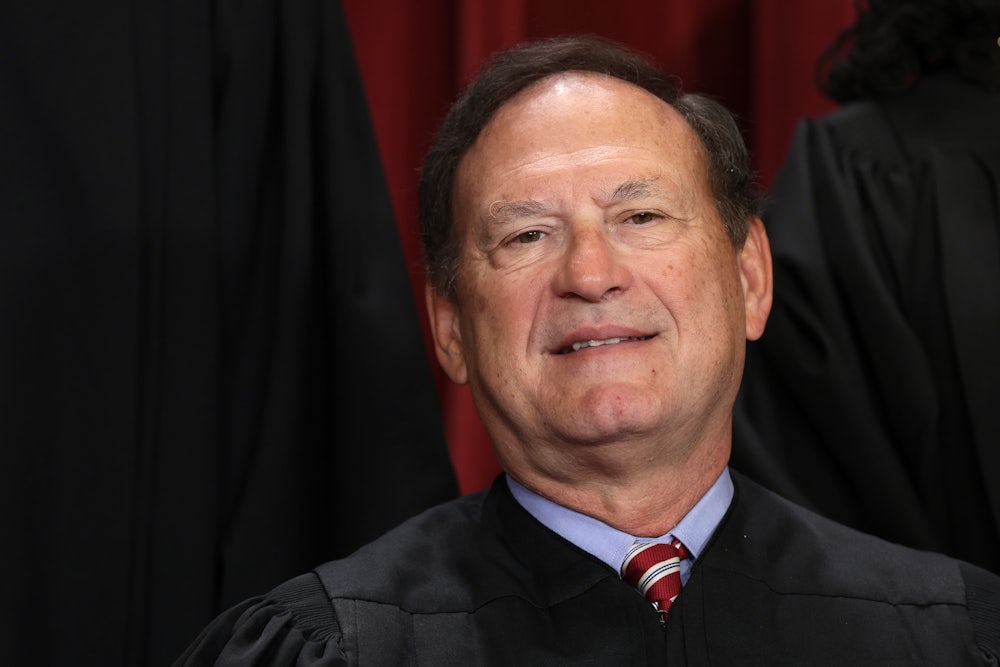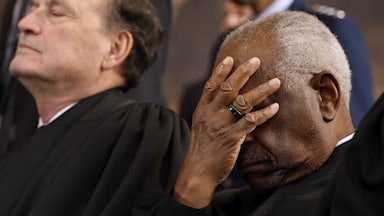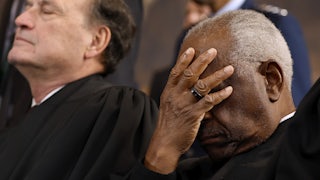No matter how closely one follows the Supreme Court, the justices will inevitably surprise you. Chief Justice John Roberts shocked the nation by voting to uphold the Affordable Care Act in 2012. Justice Neil Gorsuch stunned legal conservatives in 2020 when he wrote a landmark decision on LGBT rights in the workplace. Just last week, Justice Clarence Thomas surprised some liberal critics by authoring a ruling in favor of the Consumer Financial Protection Bureau.
This is true for liberals and conservative justices, Obama and Trump appointees, and so on—with one glaring exception. The only member of the court who has never surprised me is Justice Samuel Alito. This is not because he is particularly consistent in how he interprets laws or the Constitution. Quite the opposite, in fact. To predict how Alito will vote in any particular case, I just ask myself how a Fox News producer would view it.
That’s why the latest revelation about Alito’s extracurricular actions came as no great shock. The New York Times reported last week that in January 2021 an American flag flew upside down in Alito’s front yard. The upside-down flag was adopted by some Trump supporters at the time as a rejection of the 2020 election results.
The revelation casts doubt on whether Alito can ethically decide cases related to the January 6, 2021, attack on the Capitol. Multiple such cases are pending before the court, including one on whether Donald Trump himself is immune from prosecution for his role in the coup attempt. Alito gave no signs that he might recuse himself. “I had no involvement whatsoever in the flying of the flag,” he told the Times. “It was briefly placed by Mrs. Alito in response to a neighbor’s use of objectionable and personally insulting language on yard signs.”
He later gave his side of the story to journalist Shannon Bream. According to Alito, his wife confronted a neighbor who posted a “Fuck Trump” sign on his front yard about its propriety, citing a nearby school bus stop. The neighbor then allegedly responded by putting up a sign that personally blamed the Alitos for the January 6 attack on the Capitol.
During a subsequent walk in the neighborhood, Alito told Bream, a man who lived at the house verbally confronted them and called his wife the “c-word” at one point. “Following that exchange, Mrs. Alito was distraught and hung the flag upside down ‘for a short time,’” Bream said. “Justice Alito says some neighbors on his street are ‘very political’ and acknowledges it was a very heated time in January.”
It’s worth noting what Alito did not say in his statement to the Times or his lengthy response to Bream. He did not deny the “Stop the Steal” messaging that the upside-down flag represented. And he expressed no regret or remorse that the incident happened—in his telling, it was perfectly justified by the fact that his neighbors said inappropriate things about him and his wife.
Supreme Court justices are supposed to avoid political controversies. That is why Ruth Bader Ginsburg received so much blowback for her criticism of Trump in the 2016 election cycle, for which she later expressed regret. After a confirmation hearing in 2018 in which he blamed his woes on “the Clintons” and other unspecified enemies, Justice Brett Kavanaugh later published a column in The Wall Street Journal where he distanced himself from his comments. “I know that my tone was sharp, and I said a few things I should not have said,” he wrote.
Alito doesn’t care. He abides by judicial ethics requirements, and the general principle that judges should appear to be impartial and nonpartisan, only to the degree that they suit his own preferences. When Thomas came under considerably more criticism for his relationships with right-wing billionaires last year, for example, he responded in a formal statement that acknowledged some financial reporting errors. The rest of the public pushback campaign against the allegations came from friends and allies, not the justice himself.
When Alito faced similar allegations, he went on the offensive. The justice responded to a pre-publication request for comment from ProPublica by publishing a rebuttal in the Journal opinion section. That column, which is a bizarre read without having the ProPublica story to read alongside it, argued that he did nothing wrong under a hypertechnical reading of the court’s ethics policies at the time—thereby simultaneously missing and proving the point.
Alito’s commitment to following right-wing media cues is also undiminished by his judicial role. Chris Geidner reported on Monday that Alito sold stock in Anheuser-Busch, the manufacturer of Bud Light, shortly after conservative activists called for a boycott against the company for its use of a transgender influencer in a March Madness advertising campaign. That same day, according to periodic financial reports that Alito files with the federal courts, he bought stock in a different alcoholic beverages company. On the surface, the justice appeared to be taking part in the boycott by divesting himself from the company. Alito did not dissuade this interpretation; Geidner said the justice did not respond to requests for comment.
Alito’s opinions on the court also give the impression of a justice who is more interested in specific outcomes than methods of judicial interpretation. At times, he has insisted that he is a strenuous follower of textualism and originalism, which are the conservative legal establishment’s preferred method of reading laws and the Constitution, respectively. When the Supreme Court ruled in 2020 that LGBT workers are covered by federal workplace discrimination laws, for example, Alito all but accused Gorsuch of betraying those principles by writing the majority opinion.
“The Court attempts to pass off its decision as the inevitable product of the textualist school of statutory interpretation championed by our late colleague Justice Scalia, but no one should be fooled,” Alito wrote in his dissent. “The Court’s opinion is like a pirate ship. It sails under a textualist flag, but what it actually represents is a theory of statutory interpretation that Justice Scalia excoriated—the theory that courts should ‘update’ old statutes so that they better reflect the current values of society.”
The following term, in the case Brnovich v. Democratic National Committee, Alito “updated” the Voting Rights Act of 1965 to reflect his own policy priorities. At issue was how Section 2’s ban on racial discrimination in elections applied to a series of restrictive voting laws in Arizona that had a disproportionate impact on minority voters. Writing for the court, Alito listed a number of atextual factors that could immunize state laws from Section 2, defying his preferred method of statutory interpretation.
One of them is whether the state justified a challenge law on the basis of fighting voter fraud. “Fraud can affect the outcome of a close election, and fraudulent votes dilute the right of citizens to cast ballots that carry appropriate weight,” he wrote. “Fraud can also undermine public confidence in the fairness of elections and the perceived legitimacy of the announced outcome.” The Voting Rights Act of 1965 makes no mention of voter fraud, but mere legislative text is no match for Fox News talking points when it comes to Alito.
His dissent in last week’s major ruling on the Consumer Financial Protection Bureau’s constitutionality might be the best example yet. As I’ve noted before, the conservative legal establishment has long sought to dismantle the agency. At issue in this case was whether its funding structure, which does not require annual appropriations from Congress, was valid under the appropriations clause. The CFPB noted throughout the litigation that other financial regulators had similarly unusual funding structures, a point that persuaded Thomas when writing the majority opinion.
Alito, however, tried to hand-wave them away with reasoning and argumentation that would flunk out of an undergrad constitutional law course. The Federal Reserve Board, he explained, “is a unique institution with a unique historical background.” He then briefly recounted the policy disagreements between advocates for and opponents of a national bank. “For Appropriations Clause purposes, the funding of the Federal Reserve Board should be regarded as a special arrangement sanctioned by history,” he concluded. In other words, the Federal Reserve is special because it is special, and is not relevant here because it would be terribly inconvenient for Alito.
This question-begging footnote only underscored the weakness of his overall argument. Thomas, writing for the majority, politely but firmly pushed back against his frequent ally’s misuse of originalism. He noted that Alito “largely ignores” founding-era appropriations laws in favor of medieval English battles between the monarchy and Parliament that have no direct bearing on the case. He rejected Alito’s misinterpretation of other historical evidence as missing the point. One gets the impression that Thomas is pulling his punches here, as if unwilling to point out that his longtime colleague and friend is just making it up as he goes.
Even the Alitos’ raising of a “Stop the Steal” signal outside their home is unsurprising. It was only last month, after all, that the justice suggested during oral arguments that Trump might need immunity from prosecution because it might destabilize American democracy if he doesn’t get it.
“If an incumbent who loses a very close, hotly contested election knows that a real possibility after leaving office is not that the president is going to be able to go off into a peaceful retirement, but that the president may be criminally prosecuted by a bitter political opponent, will that not lead us into a cycle that destabilizes the functioning of our country as a democracy?” he asked at one point.
Supreme Court justices sometimes ask hypothetical questions during oral arguments that do not reflect their ultimate views of the case. This is probably not one of those times. This is a Supreme Court justice grasping for a defensible gloss to justify letting presidents commit crimes in office without fear of prosecution. Alito’s usual hostility to criminal defendants, as noted recently by NBC News’s Lawrence Hurley, went out the window as soon as Trump and other January 6 participants’ cases came before the court.
Some observers have called upon Alito to recuse himself from the case. Others want his resignation or impeachment. I would not hold my breath. Alito’s habit of deciding cases as Fox News would is stronger than any nonbinding Supreme Court ethics code. The only thing that would surprise me at this point is if Alito actually followed it here.










